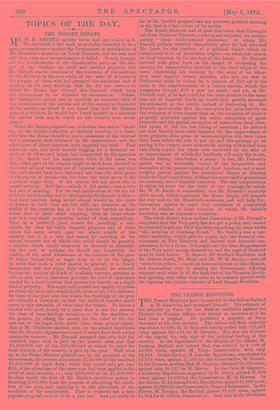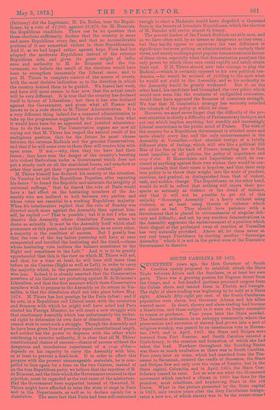THE FRENCH ELECTIONS.
THE French Elections have turned out to the full as Radical as M. Gambetta had promised himself. His estimate of the majority in Paris for the Radical candidate against the Minister for Foreign Affairs was almost as accurate as if he had been a prophet. He predicted a majority of forty thousand at the first scrutiny. The actual and final majority was about 45,000,M. de Remusat having polled only 135,467 votes, against 180,146 for M. Barodet. Nor was the decision of the capital the only sign of the political feeling of the country. In the department of the Mouths of the Rhone, M. Lockroy, Radical, and indeed Red, was elected by a vote of 53,995 votes, against M. Passy, Conservative, with only 16,454. In the Correze, M. Latrade, Republican, was elected by 35,576 votes, against 17,503 for the Conservative, M. Brunet. In the Gironde, another Red, M. Dupouy, obtained 74,633 votes, against only 38,537 for M. Maitre. In the Jura, M. Gagneur, a moderate Republican, supported by M. Gravy, gained 35,400 votes, against 14,600 for the Conservative, M. de Merona. In the Marne, M. Alphonse Picart, Republican, gained 41,226 votes, against 23,082 for the Conservative, General Boissonnet. In the Nievre, M. Tarigny, the Radical, gained 33,071 votes, against 31,954 for IL Gillois, Conservative. And only in the Morbihan
(Brittany) did the Legitimist, M. Du Bodan, beat the Repub- licans, by a vote of 47,993, against 32,676, for M. Beauvais, the Republican candidate. There can be no question that these elections sufficiently declare that the country is more and more Republican every day, and that no inconsiderable portions of it are somewhat violent in their Republicanism. And if, as we had hoped rather against hope, Paris had but adopted the moderate Republican instead of the extreme Republican side, and given its great weight of influ- ence and authority to M. de Remusat and the Go- vernment, we believe the result of the elections would have been to strengthen immensely the Liberal cause, and to put M. Thiers in complete control of the course of events, with the most decisive indication as to the direction in which the country desired them to be guided. We feared last week, and have still more reason to fear now, that the actual result will be very different. It is true that the country has declared itself in favour of Liberalism ; but then it has also declared against the Government, and given what all France well knows to be a rude shock to M. Thiers' Administration. It is a very different thing indeed for a censured administration to take up the programme suggested by the elections, from what it would have been for an approved and justified administra- tion to do the same. The Conservative organs are now all crying out that M. Thiers has reaped the natural result of his ambiguous position, that for the future he must choose between the extreme Radicals and the genuine Conservatives, and that if he will come over to them they will receive him with open arms. If not, —why, then they too have had their lesson ; they have seen the danger of the country's bursting into violent Radicalism under a Government which does not put a steady curb on all the anarchical forces, and somehow or other they must get their "government of combat."
M. Thiers himself has declared his anxiety at the situation. On Tuesday he told the Republican Deputies, after repeating his desire "to found the Republic and maintain the integrity of universal suffrage," that he feared the vote of Paris would have a bad effect on the hesitating members of the As- sembly who are inclined to halt between two parties, and whose votes are essential to a working Republican majority. When his interlocutors replied that the vote of Sunday was directed much more against the Assembly than against him- self, he replied :—" That is possible ; but it is not I who can dissolve this Assembly whose dissolution France seems to desire so ardently. It must be the Assembly itself which shall pronounce on this point, and on this question, as on every other, a majority is the condition of success. But I greatly fear that the vote of the day before yesterday will have at once exasperated and terrified the hesitating and the timid,—those whose hesitating vote inclines the balance sometimes to the Right and sometimes to the Left." And it is to be greatly apprehended that this is the view on which M. Thiers will act, and that, for a time at least, he will bear still more than before on the Centres (Right as well as Left), in order to carry the majority which, in the present Assembly, he might other- wise lose. Indeed it is already asserted that the Conservative members of his Cabinet are protesting against M. de Remusat's Liberalism, and that the first measure which these Conservative members wish to propose to the Assembly on its return to Ver- sailles, is that the dissolution shall not take place before May, 1874. M. Thiers has lost prestige by the Paris defeat ; and if he acts, in a Republican and Liberal sense, with the resolution and firmness with which he might well have acted had Paris elected his Foreign Minister, he will court a new struggle with that reactionary Assembly which has unfortunately the techni- cal right to determine its own date of dissolution. M. Thiers cannot wish to court such a struggle. Though the Assembly and he have been given lives of precisely equal constitutional length, and neither has the power to dispense with the other while continuing to exercise authority, it is clear that all M. Thiers' constitutional chance of success—chance of success without the dangerous and treacherous experiment of a coup d'e'tat- depends on his capacity to carry the Assembly with him, or at least to prevent a dead-lock. If in order to effect this purpose with the present unmanageable materials, he is com- pelled to lean again for a time on the two Centres, instead of on the true Republican party, we believe that the rejection of M. de Rem usat, and the blow which the Government received in that rejection, must be regarded as the real cause of the misfortune. Had the Government been supported instead• of thwarted, M. Thiers might have afforded to raise the state of siege in Paris and in the Departments, as well as to declare openly for a dissolution. The mere fact that Paris had been self-restrained
' enough to elect a Moderate would have dispelled a thousand fears in the breasts of irresolute Republicans, which the election of M. Barodet will revive almost to frenzy.
The present leaders of the French Radicals are able men, and as we have often said, by no means so dangerous as they seem ;
but they hardly appear to appreciate the vast difference in significance between getting an administration to embody their views, and merely making a great popular demonstration in favour of those views, especially when that demonstration paralyses the only power by which these men could rapidly and safely attain their end. If M. Thiers should now take courage to play the Radical,—which is certainly opposed to his own political ten- dencies,—he would be accused of yielding to the mob what he would not yield to the Assembly, and so his authority in
the Assembly would be greatly weakened. But if, on the other hand, his candidate had triumphed, the very policy which would now seem like the weakness of undignified concession, would then have appeared the firmness of conscious strength. We fear that M. 0 ambetta's strategy has seriously retarded the triumph of the policy at which he aims.
However, we must never forget that the difficulty of the pre- sent situation is chiefly a difficulty of Parliamentary tactique, and not one which implies anything but steadily Sand increasingly Liberal convictions in the public mind of France. The wish of the country for a Republican Government is attested more and more clearly every day, and the only embarrassment is the Assembly at Versailles,—that obsolete vestige of a totally different state of feeling, which still sits like a political Old Man of the Sea on the back of France, tempting her to that most impolitic of all policies, the policy of impatience and coup d'e'tat. If Monarchists and Imperialists could be con- vinced of anything against their own wishes, they would be con- vinced already that their cause is hopeless, and that their only true policy is to throw their weight into the scale of prudent, cautious, and gradual, as distinguished from that of violent, rash, and sudden, change. The Republicans, on the other hand, would do well to reflect that nothing will injure their pro- spects so seriously as violence or the dread of violence, and that it will not be possible to get rid of this unlucky "Sovereign Assembly" in a hurry without using violence, or at least using threats of violence which are quite as bad. They should have patience with a Government that is placed in circumstances of singular deli- cacy and difficulty, and not by any needless demonstrations in the Assembly aggravate the embarrassment of a position which their disgust at the prolonged sway of reaction at Versailles has very naturally provoked. Above all, let them never at any cost tempt Providence by electing another "Sovereign Assembly" which it is not in the power even of the Executive Government to dissolve.



































 Previous page
Previous page